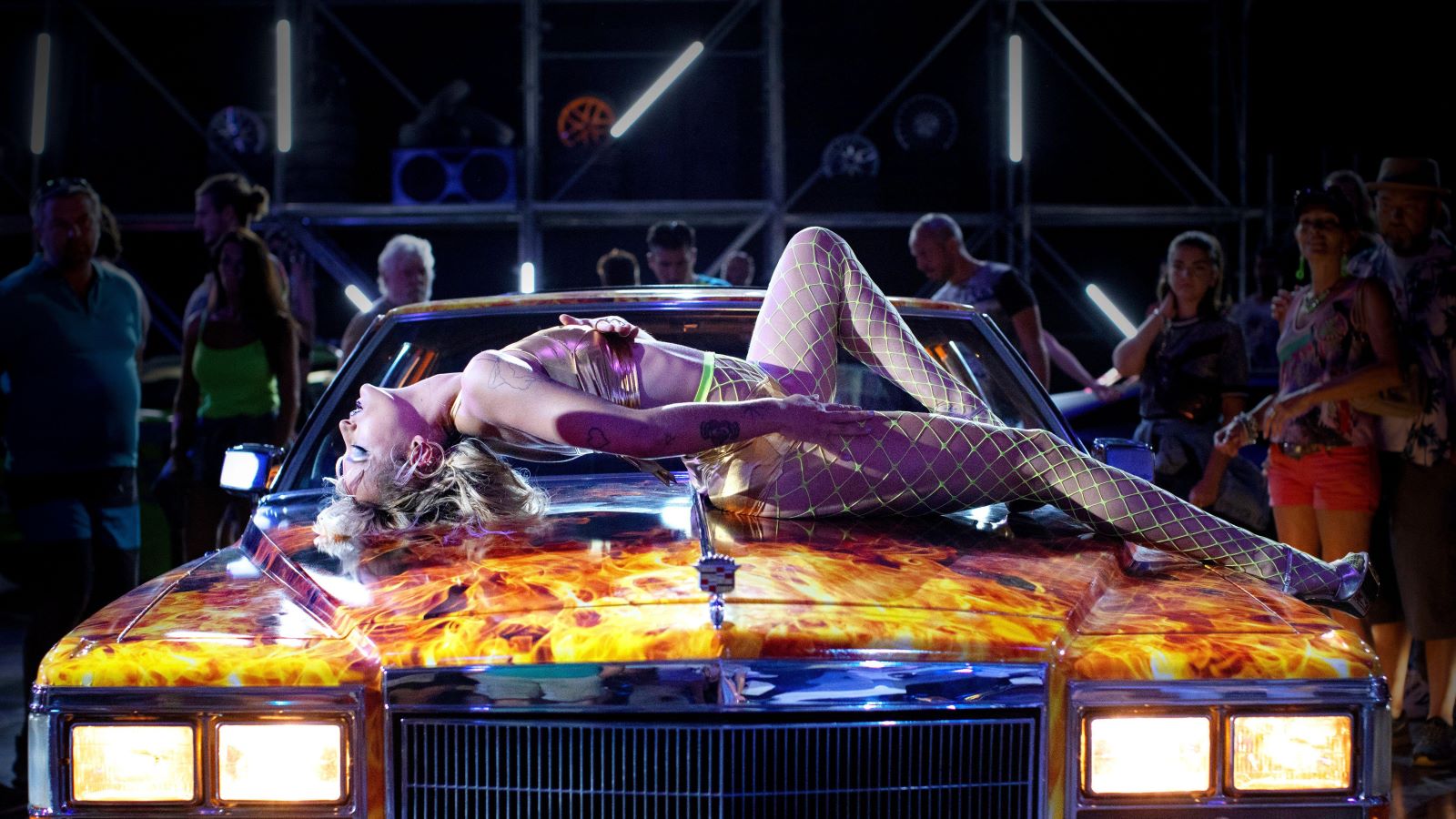What to Watch Verdict
Titane vibrates with a dizzying, dazzling blur of menace, complexity and metamorphosis — Julia Ducournau asserts herself as a fearless visionary filmmaker unlike others in her field.
Pros
- +
🏎️ Unparalleled confidence
- +
🏎️ Lead actress Agathe Rousselle commits mightily
- +
🏎️ Cinematography that hums
- +
🏎️ Marches to the rev of its own engine
Cons
- -
🏎️ Better at illustrations than storytelling
- -
🏎️ Style exceeds substance
- -
🏎️ Feels like 17 different movies
- -
🏎️ Marches to the rev of its own engine
“Titane: A metal highly resistant to heat and corrosion, with high tensile strength alloys.”
Compared to Titane, Raw is Julia Ducournau playing tame and accessible with cannibalistic feminism. Review from Cannes, where it won the Palme d'Or, dubbed Ducournau’s eccentric follow-up a masterstroke of durability and madness, but understand it’ll become known as the most divisive title of 2021 and beyond.
Titane writhes with its audiences as sinful pleasures lead to serial skewerings, then further and further off the rails into psycho-unstable Hallmark gone manic familial heartwarmers — its narrative exists to serve no master. I can’t help but remain awe-struck by the way Ducournau artfully envelops audiences in so much oil-slick displeasure to the point where girlfriends gnawing on thigh meat is a calming respite. It’s all so uncomfortably alluring, poetically deviant and astonishingly unsafe, down to the last revved engine.
What a dizzying blur of menace, complexity and metamorphosis. I think a little resistance to the "heat and corrosion" on display would serve nicely, but that's not the tonally twisted titillation Ducournau desires.
Agathe Rousselle acts as Ducournau’s muse, thrusting herself into a world of murders, mechanophilia and misinformation as Alexia. There’s no way around the film’s instigating action — a flame-detailed Cadillac impregnates Alexia in a sequence complete with hydraulics that bounce and pump in a fit of passion. That’s no spoiler, given how Titane presents its readily available information. What happens next holds the film’s more animalistic, wholesome and bracingly chaotic beats that swerve more than Dominic Toretto with blown-out rear tires. Alexia gets involved with the sexually free-spirited Justine (Garance Marillier) and a firefighter chief named Vincent (Vincent Lindon) who latches onto the memory of his missing son, all while her baby-bump inflates via bare-all practical effects.
My contemplation over where to start and end my analysis summarizes Ducournau’s narrative dilemma — what I’ll dub as “here we are” syndrome.
Titane daydreams through subplots that cycle like randomized tracks on a jukebox, starting with adolescent Alexia’s surgical head trauma repair — the insertion of a titanium plate — only to jump ahead as the mature, erotic dancer version of Alexia entrances underground auto show audiences. Although that’s the least dismantling leap. At least we’re privy to Alexia’s vehicular attraction since her younger self caresses the family sedan’s exterior like a companion, then smooches the driver-side window. It’s more how Ducournau incorporates serial slashings, traumatic repressions and an ultimate reclamation of self through absurdist means that lacks a certain continuity (intentional). It’s all show; no tell. Mileage will vary.
The latest updates, reviews and unmissable series to watch and more!
That stated, Titane is visionary and anarchistic cinema. Alexia’s journey speeds with the intensity of raceway excitement as sumptuous, lustful cinematography by Ruben Impens aids Ducournau’s devilish desires that always favor some form of macabre. We might not comprehend the crime scene that unfolds — no backstory, all experience — and yet there’s a hypnotic quality to presentations.
Rousselle navigates her character’s bodily anomalies — mechanical lubricant lactations, for one — as exceptionally as her entertaining nonchalance when in hunter-massacre mode. Alexia is this raging inferno who combusts like the uncontrollable flames Vincent faces with his crew — the sorrow-soaked captain fights Alexia’s darkness like any fire, as the two form a genuine relationship that blurs into sincere salvation. The ultimate expression of chosen families finding themselves through French extremity rings clear, if only as one completed arc in a chain of broken clasps.
Ducournau leans into nudity as liberation in intentions, as Rousselle spends what seems like the lion’s share of her screen time full-frontal naked. Maybe she’s moaning in fits of backseat passion or wrapping herself with bandages to trick Vincent into thinking she’s his long-lost son — Rousselle fears not the vulnerability of human figures, as Ducournau emphasizes. I’m not positive the gaze sustains as women continue to be “objectified” while, for example, their male counterparts are framed from the waist up. Still, there is a message conveyed in the stripped nature of Alexia’s painful theatrics. More so, it speaks to the impossible task of SFX artists convincing audiences Rousselle is supernaturally pregnant, which is achieved — Rousselle transforms well beyond developmental habits.
Titane would make Gaspar Noé blush and asserts Julia Ducournau as a rebellious cinematic imagnieer for whom no boundaries exist. Whether you’re enamored to the point of epiphany or lost within minutes of Ducournau's sophomore wonder, there’s no argument against the stunning confidence on display.
My qualms and quibbles are related to edginess that engages with or without substance (reads will vary), as Rousselle is able to emphatically guide us through the violent vileness, corpses and emotional lashes that cause us to recoil. It’s simultaneously a sensory overload and senseless tale; a signature that defines “bonkers energy.” I’m just not sure if the sectional intrigue — Alexia’s growing fetus, Vincent’s caretaker, Alexia’s slaughter spree and Alexia’s attraction — ever feel like they belong in the same movie.
Matt Donato is a Rotten Tomatoes approved film critic who stays up too late typing words for What To Watch, IGN, Paste, Bloody Disgusting, Fangoria and countless other publications. He is a member of Critics Choice and co-hosts a weekly livestream with Perri Nemiroff called the Merri Hour. You probably shouldn't feed him after midnight, just to be safe.


